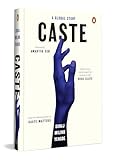Caste : A global story - A powerful account of dalit rights, caste discrimination, and social justice movements around the world / By Suraj Milind Yengde
Publication details: Haryana Penguin Random House 2025Description: ix, 384 Pages 24 cmISBN:- 9780670096312 (Hardback)
- 305.5422
| Item type | Current library | Shelving location | Call number | Materials specified | Status | Notes | Date due | Barcode | |
|---|---|---|---|---|---|---|---|---|---|
 BOOKs
BOOKs
|
National Law School | General Stacks | 305.5422 YEN (Browse shelf(Opens below)) | HB | Checked out | Recommended by Dr. Chandraban P Yadav | 14.11.2025 | 40419 |
Foreword by Amartya Sen -
Introduction -
1. Colonial Dalitality: The Occidental and Oriental Treatment of Caste -
2. Affairs of Letters: Dalit Responses to Black Literature -
3. Race and Caste: In the Age of Dalit-Black Lives Matter -
4. The Dalit Republic of Diaspora: A Case Study of Trinidad -
5. Cosmopolitan Dalit Universalism: Dalit Activism and the Promise of an Anti-Caste World -
6. Conclusion: Biography of Dalit Agonism—Field Notes from the Diary of an Archivist -
Acknowledgements -
Appendix: List of Dalit Organizations -
List of Illustrations -
Notes -
Bibliography -
Index.
Caste, and caste-based discrimination, are not just Indian issues. They are experienced throughout the world, from Britain to Bahrain, Canada to South Africa. This is a global phenomenon, demanding global solutions.
Leading scholar Suraj Milind Yengde shines a light on the Dalit experience internationally, from indentured labourers in the nineteenth-century Caribbean to present-day migrant workers in the Middle East. Combining history, ethnography and archival research, he offers a compelling, comparative approach to caste and race from ancient times to today. What have been the impacts of colonialism, religion and nationalism on caste-based hierarchies worldwide? What can we learn from caste-related movements in India and internationally? Why hasn’t the South Asian diaspora embraced the anti-caste struggles of the homeland? And what are the limits of Dalit–Black solidarity?
Exploring the global footprint of the anti-caste struggle—from its links with Black Lives Matter to the work of international Ambedkarite organisations—this is a powerful analysis of world politics from the perspective of one of the most oppressed communities on Earth. Asking probing questions about the nature of inequality, Yengde issues an energetic call for a cosmopolitan Dalit universalism, as a vital part of today’s fight for social justice and equality.
There are no comments on this title.
